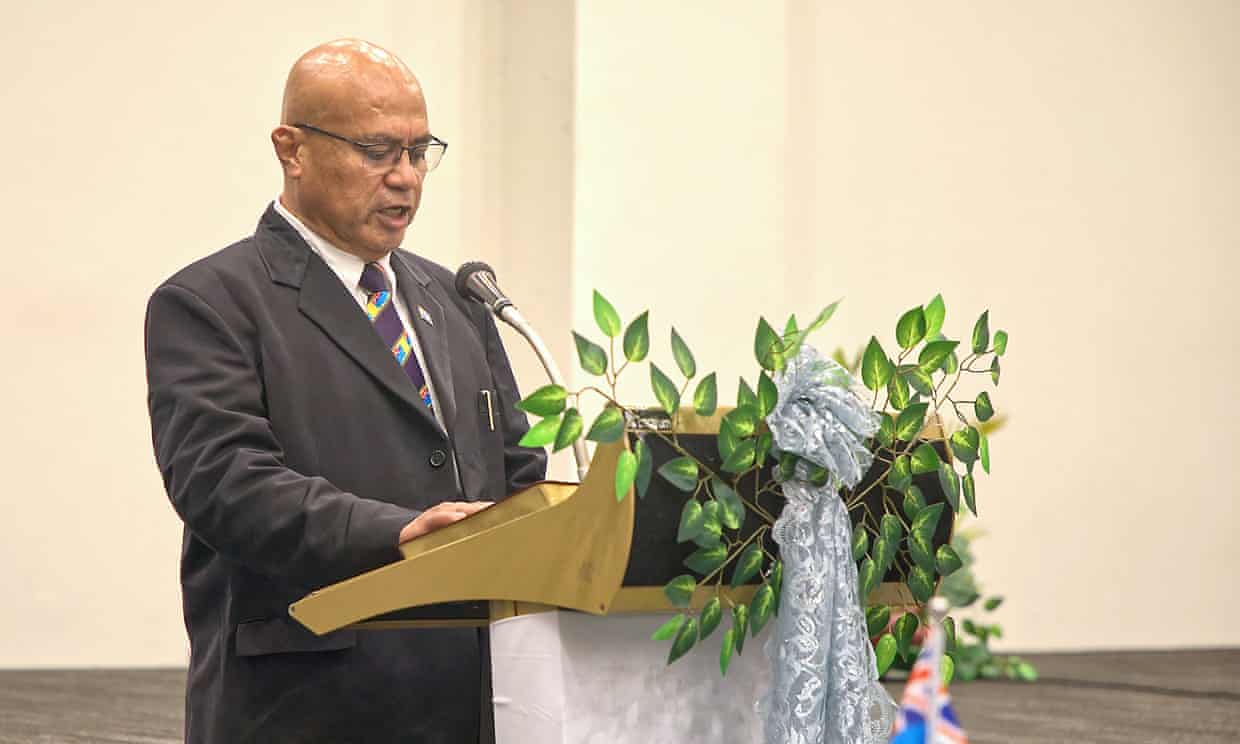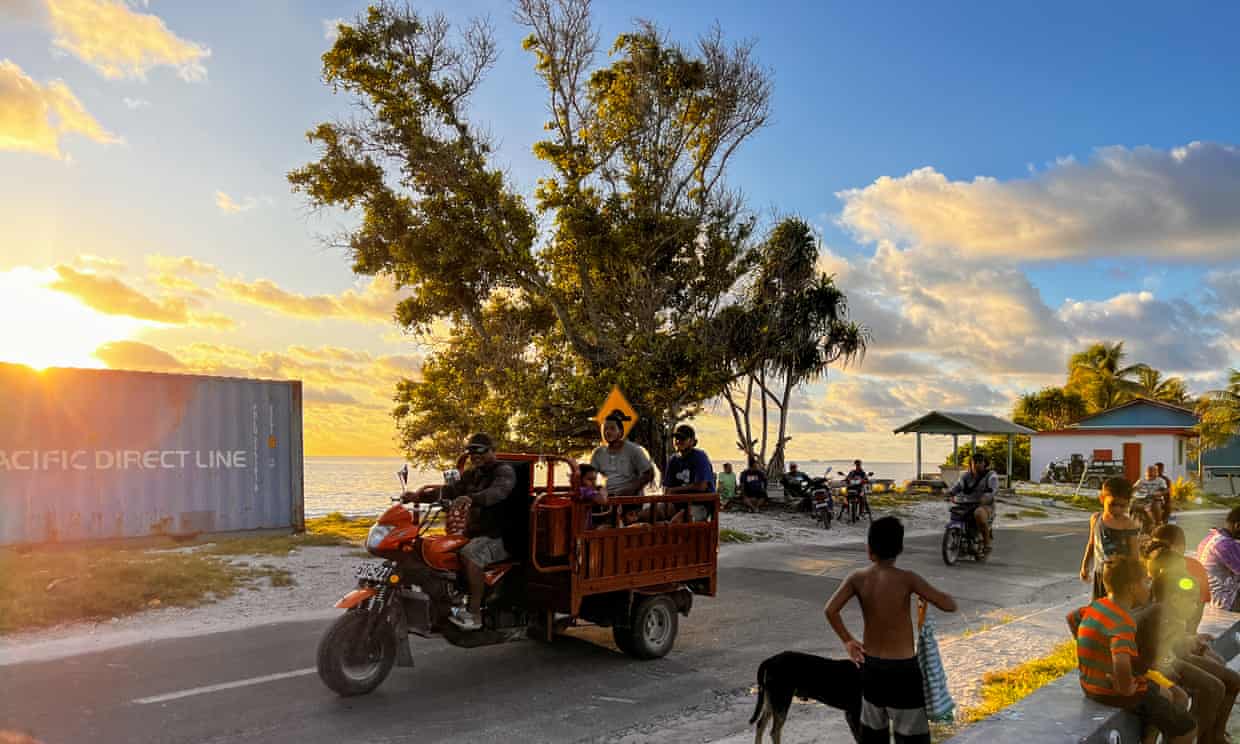Feleti Teo tells the Guardian Tuvaluans fear last year’s treaty may give Australia too much say over the Pacific nation’s security
Tuvalu’s new prime minister, Feleti Teo, wants “guarantees” from Canberra that a landmark treaty with Australia will not undermine his country’s sovereignty.
Teo, who was appointed leader last month, told the Guardian a controversial security clause in the Falepili Union treaty has led to fears among Tuvaluans that Australia “might encroach on Tuvalu’s sovereignty”.
The treaty, signed in late 2023, states that the Pacific nation shall “mutually agree with Australia” on partnerships or arrangements with other states on security and defence-related matters. The clause in effect gives Australia veto power over Tuvalu entering into security agreements with other countries, and comes amid intense competition for influence in the Pacific.
“That obviously gives the impression of Tuvalu conceding its sovereignty to decide whatever security arrangement it prefers,” Teo said, who added he was disappointed at how quickly the previous government had entered into the agreement with Canberra.
“What I’ve asked the Australians is that if we are able to come to some arrangement that stopped short of revising the treaty, that guarantees and assures that Tuvalu’s sovereignty is intact. Then I’m all good for it,” Teo said, without giving detail on what form any “guarantee” should take.
The sweeping treaty – signed between prime minister Anthony Albanese and Tuvalu’s then prime minister Kausea Natano – also offers a special migration pathway for up to 280 Tuvalu citizens a year to live and work in Australia.
Teo, a former attorney general who advised the Tuvalu government during the drafting of the deal, says he wished more time had been given to public consultation on the terms of the treaty. As a result, he said his government will soon launch a campaign to better explain the intricacies of the deal to the nation.
“When the treaty was negotiated, there was no consultation with the public, so the people frowned on the treaty when it came out,” he said, adding that he had already discussed his concerns with Australian officials who visited this week.
“That’s why we are mounting an educational programme to socialise and explain to [the Tuvaluan public] the entirety of the treaty,” he said.
Teo said his government would “stop short” of changing any aspects of the deal, while seeking to address sovereignty concerns. “If we will seek direct amendment of the treaty then it’s going to take a long time to be able to bring that into effect,” he said. “If there is a way that stops short of revising the treaty that guarantees the integrity of the sovereignty of Tuvalu, then we will certainly explore those options.”

A spokesperson from Australia’s Department of Foreign Affairs and Trade said the treaty “recognises that the statehood and sovereignty of Tuvalu will continue”.
Australia has sought greater security ties with several Pacific nations, in what is widely seen as a response to China’s own desire to strike bilateral deals around policing and territorial access in the region. Last year, China and Solomon Islands signed a deal on police cooperation as part of a “comprehensive strategic partnership” between the two nations.
James Batley, a policy fellow in Pacific affairs at the Australian National University and a former high commissioner to Tuvalu, said given the geopolitical context, there was greater “impetus” for Australia to enshrine security assurances when negotiating with Pacific nations.
“Australia has made the point that decisions by Pacific island governments affect Australia’s national security,” Batley said. “What Australia gets out of this [Falepili treaty] is the reassurance that Tuvalu could not be used in a way that undermines our national interests, given the special status that we have granted Tuvalu through this treaty.”
China’s rising influence in the Pacific was further brought into the spotlight during Tuvalu’s recent elections. Tuvalu is one of the few countries in the world that still maintains formal diplomatic ties with Taiwan over China, and some had suspected that a change in leadership may have prompted the government to review this foreign policy.
Teo acknowledged that other Pacific countries had been “flip flopping” between Taiwan and China, but dismissed any speculation that his government would do the same. He said he had not been approached by Chinese delegates before or since his election.
“I have far more immediate pressing development challenges,” Teo said, listing examples such as the need to improve medical and educational services to Tuvalu’s remote islands. “Those are more pressing in my own calculations than wasting efforts on engaging on the China discourse.”
The climate crisis is also a priority for Tuvalu’s government, and it has therefore been criticised for not negotiating stricter emissions reduction targets in its treaty with Australia. Tuvalu, along with other Pacific nations, is pushing for a global fossil fuel non-proliferation treaty that advocates for a phasing out of oil, gas and coal production.
Asked if Tuvalu’s new government would urge Australia to stop any new fossil fuel projects, Teo said he was already “heartened” by Albanese’s climate commitments made during their recent phone call.
“It was my first conversation with the prime minister of Australia so I took it on face value that the Australian government is committed to reducing their level of emissions,” he said.
“I’ll just take that and observe their actions and hopefully that will match their commitment.”
